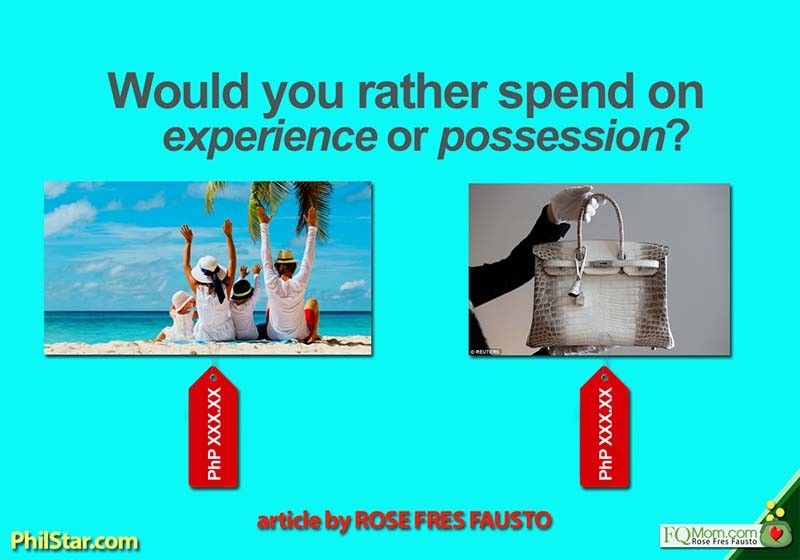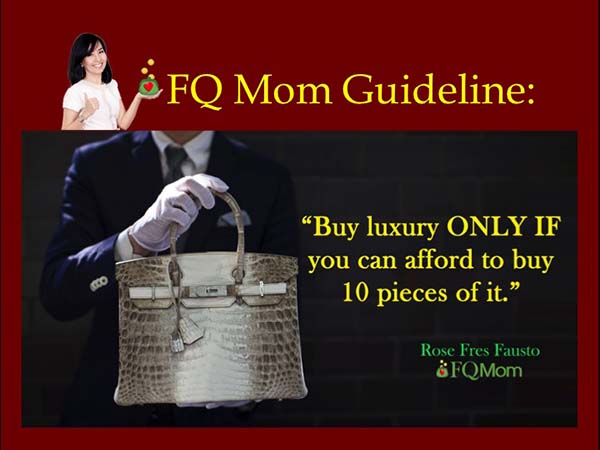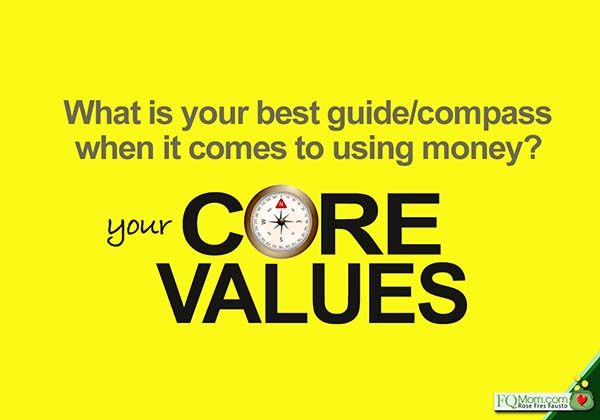Would you rather spend on experience or possession?


Money is a tool that helps us attain happiness. And because it’s a finite resource (at least for ordinary mortals), we have to allocate it properly in order to “buy” us as much happiness as we can for ourselves and our family.
The question is, “Which gives us more happiness – buying experience or buying stuff?”
Although it may seem intuitive to answer that buying possession is a better “investment” because ownership is tangible and lasting while an experience is intangible and fleeting, this is not the case. In various studies done by Cornell University Psychology professor Thomas Gilovich and his colleagues over a span of decades, it was concluded that happiness is derived more from purchase of experiences vs. purchase of stuff. (Click Experiential consumption and the pursuit of happiness to read the study.)
The happiness derived from buying things fade quickly because of the following:
1. We get used to our possessions. What used to give us a thrill goes away and we sometimes stop appreciating them. This is what is called hedonic adaptation.
2. Our expectations tend to keep increasing. Because the initial thrill is gone, we sometimes look for more utility/satisfaction from them.
3. We start to compare our possessions with others.
On the other hand, happiness derived from experiences last longer because of the following:
1. Anticipating an experience brings excitement and enjoyment, while anticipating the possession of stuff causes impatience. Imagine planning your vacation vs. waiting for the gadget you ordered from Amazon or Lazada or Zalora to arrive. There’s a difference, right?
2. Comparisons don’t really matter when it comes to experience because the happiness you derive is more personal. Imagine comparing your last family vacation with your neighbor’s. Who can say for sure that one family’s vacation was better than the other, as compared to picking who’s got the better car?
3. Experiential purchases are more associated with identity and more social in nature. Humans are social beings and since an experience is usually with family and friends or even just the people you will interact with in the case of solo vacation, retreat, etc., you will find it more valuable. Also, you might notice that people don’t like hearing about other people’s possessions very much as compared to hearing about their experiences. Think social media posts, we are more okay to see posts about food trip or travel and other experiences, as compared to seeing posts of new cars and expensive gizmos acquired.
4. The fleetingness and intangibility of experiences work well for a happy story of our remembering self. Nobel Prize winner Daniel Kahneman, who is one of the founders of Behavioral Economics, talked about the distinction of our experiencing self (refers to what we actually felt at that moment; it only has the present) and our remembering self (refers to what we remember and think we felt during the experience; the one that lasts forever). Watch his Ted Talk entitled "The Riddle of Experience vs. Memory" where he concluded that it’s the remembering self that dictates our happiness more than the experiencing self. While the purchase of stuff and our continuing ownership of the same opens up to questioning if the purchase was worth it, especially if the thing starts to deteriorate or become obsolete, a purchase of an experience can no longer be subjected to such scrutiny. Its fleetingness actually endears it to us and adds value to the purchase, especially if our remembering self gives it a high score on the happiness index.
While the purchase of stuff and our continuing ownership of the same opens up to questioning if the purchase was worth it, especially if the thing starts to deteriorate or become obsolete, a purchase of an experience can no longer be subjected to such scrutiny. Its fleetingness actually endears it to us and adds value to the purchase, especially if our remembering self gives it a high score on the happiness index. Think of your cellphone which is now conking up on you, as compared to a vacation with your family years ago. Sometimes even if the weather didn’t cooperate that you had to stay indoors more than you planned for, you might have concluded, “At least we were able to bond well with our kids inside the resort!” That’s your remembering self turning a bad story into a good one, which is what will stay with you and dictate the happiness you derived.
Given all the above, we are better off spending not just our money but also other important resources such as time in creating wonderful experiences with our family and loved ones.
For the purchase of things that we have decided to make, let us try to apply the factors cited above to maximize happiness. First, since we now know that anticipation adds excitement, instead of getting impatient while waiting for your stuff to arrive, plan and imagine what experiences you can do with that item. More importantly, say no to impulse buying. This habit not just messes up your budget but also deprives you of the pleasure of anticipation. And what better way to increase satisfaction from the anticipation than by observing the third basic law of money, “Have an army of golden slaves before you buy luxury.” and the companion FQ Mom guideline, “Buy luxury only if you can afford to buy 10 pieces of it.” ![]()

And if I may add, do not forget to use your compass in spending – whether it be for buying stuff or experience. Always ask yourself, “Does this agree with my core values?” If you’re able to do this successfully in your purchases, I promise you, your financial journey will be a happy one.

Cheers to high FQ! ![]()
********************
ANNOUNCEMENTS
1. Watch out for my next book FQ: The nth Intelligence coming out soon. This is in collaboration with ABS-CBN Publishing Inc.
2. Want to know your FQ score? Take it today. Click link to take the test. http://rebrand.ly/FQTest

Rose Fres Fausto is a speaker and author of bestselling books “Raising Pinoy Boys” and “The Retelling of The Richest Man in Babylon” (English and Filipino versions). Click this link to read samples – Books of FQ Mom. She is a behavioral economist, a certified gallup strengths coach and the grand prize winner of the first Sinag Financial Literacy Digital Journalism Awards. Follow her on Facebook & YouTube as FQ Mom, and Twitter & Instagram as theFQMom.



















